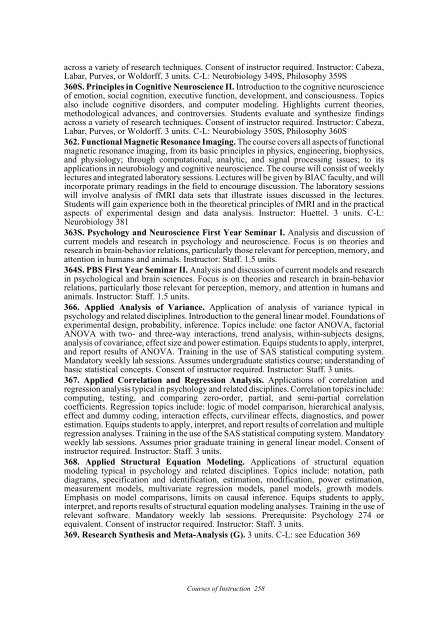Duke University 2008-2009 - Office of the Registrar - Duke University
Duke University 2008-2009 - Office of the Registrar - Duke University
Duke University 2008-2009 - Office of the Registrar - Duke University
Create successful ePaper yourself
Turn your PDF publications into a flip-book with our unique Google optimized e-Paper software.
across a variety <strong>of</strong> research techniques. Consent <strong>of</strong> instructor required. Instructor: Cabeza,<br />
Labar, Purves, or Woldorff. 3 units. C-L: Neurobiology 349S, Philosophy 359S<br />
360S. Principles in Cognitive Neuroscience II. Introduction to <strong>the</strong> cognitive neuroscience<br />
<strong>of</strong> emotion, social cognition, executive function, development, and consciousness. Topics<br />
also include cognitive disorders, and computer modeling. Highlights current <strong>the</strong>ories,<br />
methodological advances, and controversies. Students evaluate and syn<strong>the</strong>size findings<br />
across a variety <strong>of</strong> research techniques. Consent <strong>of</strong> instructor required. Instructor: Cabeza,<br />
Labar, Purves, or Woldorff. 3 units. C-L: Neurobiology 350S, Philosophy 360S<br />
362. Functional Magnetic Resonance Imaging. The course covers all aspects <strong>of</strong> functional<br />
magnetic resonance imaging, from its basic principles in physics, engineering, biophysics,<br />
and physiology; through computational, analytic, and signal processing issues; to its<br />
applications in neurobiology and cognitive neuroscience. The course will consist <strong>of</strong> weekly<br />
lectures and integrated laboratory sessions. Lectures will be given by BIAC faculty, and will<br />
incorporate primary readings in <strong>the</strong> field to encourage discussion. The laboratory sessions<br />
will involve analysis <strong>of</strong> fMRI data sets that illustrate issues discussed in <strong>the</strong> lectures.<br />
Students will gain experience both in <strong>the</strong> <strong>the</strong>oretical principles <strong>of</strong> fMRI and in <strong>the</strong> practical<br />
aspects <strong>of</strong> experimental design and data analysis. Instructor: Huettel. 3 units. C-L:<br />
Neurobiology 381<br />
363S. Psychology and Neuroscience First Year Seminar I. Analysis and discussion <strong>of</strong><br />
current models and research in psychology and neuroscience. Focus is on <strong>the</strong>ories and<br />
research in brain-behavior relations, particularly those relevant for perception, memory, and<br />
attention in humans and animals. Instructor: Staff. 1.5 units.<br />
364S. PBS First Year Seminar II. Analysis and discussion <strong>of</strong> current models and research<br />
in psychological and brain sciences. Focus is on <strong>the</strong>ories and research in brain-behavior<br />
relations, particularly those relevant for perception, memory, and attention in humans and<br />
animals. Instructor: Staff. 1.5 units.<br />
366. Applied Analysis <strong>of</strong> Variance. Application <strong>of</strong> analysis <strong>of</strong> variance typical in<br />
psychology and related disciplines. Introduction to <strong>the</strong> general linear model. Foundations <strong>of</strong><br />
experimental design, probability, inference. Topics include: one factor ANOVA, factorial<br />
ANOVA with two- and three-way interactions, trend analysis, within-subjects designs,<br />
analysis <strong>of</strong> covariance, effect size and power estimation. Equips students to apply, interpret,<br />
and report results <strong>of</strong> ANOVA. Training in <strong>the</strong> use <strong>of</strong> SAS statistical computing system.<br />
Mandatory weekly lab sessions. Assumes undergraduate statistics course; understanding <strong>of</strong><br />
basic statistical concepts. Consent <strong>of</strong> instructor required. Instructor: Staff. 3 units.<br />
367. Applied Correlation and Regression Analysis. Applications <strong>of</strong> correlation and<br />
regression analysis typical in psychology and related disciplines. Correlation topics include:<br />
computing, testing, and comparing zero-order, partial, and semi-partial correlation<br />
coefficients. Regression topics include: logic <strong>of</strong> model comparison, hierarchical analysis,<br />
effect and dummy coding, interaction effects, curvilinear effects, diagnostics, and power<br />
estimation. Equips students to apply, interpret, and report results <strong>of</strong> correlation and multiple<br />
regression analyses. Training in <strong>the</strong> use <strong>of</strong> <strong>the</strong> SAS statistical computing system. Mandatory<br />
weekly lab sessions. Assumes prior graduate training in general linear model. Consent <strong>of</strong><br />
instructor required. Instructor: Staff. 3 units.<br />
368. Applied Structural Equation Modeling. Applications <strong>of</strong> structural equation<br />
modeling typical in psychology and related disciplines. Topics include: notation, path<br />
diagrams, specification and identification, estimation, modification, power estimation,<br />
measurement models, multivariate regression models, panel models, growth models.<br />
Emphasis on model comparisons, limits on causal inference. Equips students to apply,<br />
interpret, and reports results <strong>of</strong> structural equation modeling analyses. Training in <strong>the</strong> use <strong>of</strong><br />
relevant s<strong>of</strong>tware. Mandatory weekly lab sessions. Prerequisite: Psychology 274 or<br />
equivalent. Consent <strong>of</strong> instructor required. Instructor: Staff. 3 units.<br />
369. Research Syn<strong>the</strong>sis and Meta-Analysis (G). 3 units. C-L: see Education 369<br />
Courses <strong>of</strong> Instruction 258









